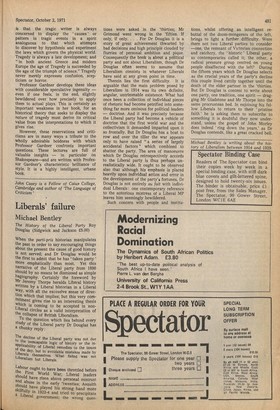Liberals' failure
Michael Bentley
The History of the Liberal Party Roy Douglas (Sidgwick and Jackson £5.00) When the parti-pris historian manipulates the past in order to say encouraging things about the present the cause of good history is not served; and Dr Douglas would be the first to admit that he has 'taken party' more emphatically than most. Yet this narrative of the Liberal party from 1890 Should by no means be dismissed as simple hagiography. Certainly the foreword by Mr Jeremy Thorpe heralds Liberal history written by a Liberal historian in a Liberal way, with all the excessive sense of direction which that implies; but this very commitment gives rise to an interesting thesis Which is coming to be accepted in nonLiberal circles as a valid interpretation of the collapse of British Liberalism. To the question which lies behind every study of the Liberal party Dr Douglas has a chunky reply :
The decline of the Liberal party was not due to the inescapable logic of history or the inapplicability of Liberal remedies to the issues of the day, but to avoidable mistakes made by Liberals themselves. What failed was not Liberalism but Liberals.
Labour ought to have been throttled before the First World War; Liberal leaders should have risen above personal mistrust and abuse in the early 'twenties; Asquith Should have played his strong hand more Skilfully in 1923-4 and tried to precipitate a Liberal government; the wrong ques
tions were asked in the 'thirties; Mr Grimond went wrong in the 'fifties. If only, if only. . . . For Dr Douglas it is a story of great achievement thwarted by bad decisions and high principle clouded by flurries of personal ambition and pique. Consequently the book is about a political party and not about Liberalism, though Dr Douglas often seems to assume that Liberalism consists in whatever Liberals have said at any given point in time.
Therein lies the first difficulty. It is arguable that the main problem posed by Liberalism in 1914 was its own definite, angular, untrimmable existence. What had once been a collection of individual pieces of rhetoric had become petrified into something far more ominous for political leaders — doctrine. And it was precisely because the Liberal party had become a vehicle of doctrine that the first world war and the collectivism it demanded impacted upon it so frontally. But Dr Douglas has a boat to row and over the tiller the war appears only to have raised "a series of largely accidental factors" which combined to shatter the party. The area of manoeuvre which Dr Douglas retrospectively accords to the Liberal party is thus perhaps unrealistically wide. It ought to be observed also that although his emphasis is placed heavily upon individual action and error in the development of the party's fortunes, Dr Douglas is not entirely au fait with individual Liberals : one contemporary reference to the notorious mistress of a Liberal MP leaves him seemingly bewildered.
Such concern with people and institu tions, whilst offering an intelligent rebuttal of the doom-mongerers of the left, brings to light a further difficulty. Were there not two Liberal parties to consider —one, the remnant of Victorian connection and catchcry, the 'historic ' Liberal party as contemporaries called it; the other, a radical pressure group centred on young people disaffected with the left? During the fifteen years which Dr Douglas selects as the crucial years of the party's decline this couple lived cattily together until the death of the elder partner in the 'thirties. But Dr Douglas is content to write about one party, one tradition, one spirit — dragging Mr Gladstone and Mr Thorpe into the same procrustean bed. In enjoining his fellow Liberals to return to their pristine faith' he is asking them to subscribe to something it is doubtful they now understand, unless the gospel of John Morley does indeed 'ring down the years,' as Dr Douglas contends, like a great cracked bell.
Michael Bentley is writing about the history of Liberalism between 1914 and 1929.
































 Previous page
Previous page